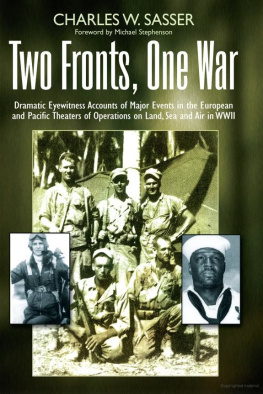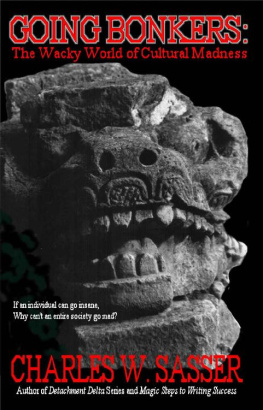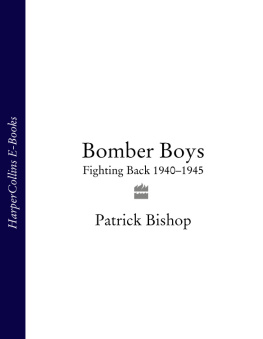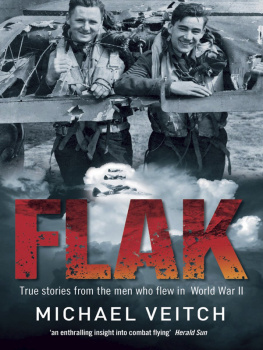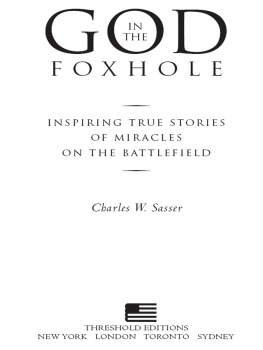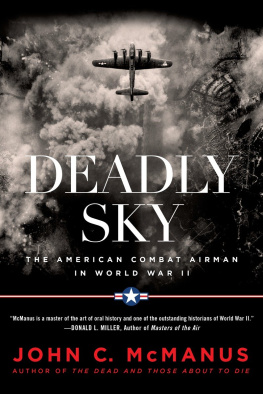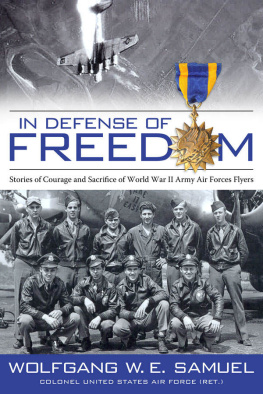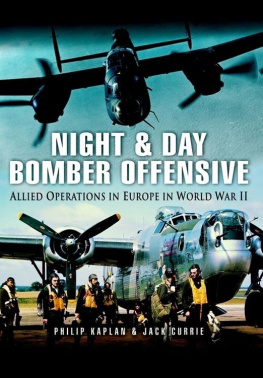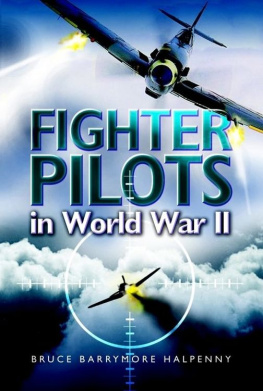
Two Fronts, One War
This edition published in 2014 by Frontline Books,
an imprint of Pen & Sword Books Ltd,
47 Church Street, Barnsley, S. Yorkshire, S70 2AS
www.frontline-books.com
Copyright Charles Sasser, 2014
The right of Charles Sasser to be identified as the author of this work
has been asserted by him in accordance with the
Copyright, Designs and Patents Act 1988.
HARDBACK ISBN: 978-1-84832-727-6
PDF ISBN: 978-1-47383-636-5
EPUB ISBN: 978-1-47383-460-6
PRC ISBN: 978-1-47383-548-1
All rights reserved. No part of this publication may be reproduced, stored in
or introduced into a retrieval system, or transmitted, in any form, or by any
means (electronic, mechanical, photocopying, recording or otherwise)
without the prior written permission of the publisher. Any person who does
any unauthorized act in relation to this publication may be liable
to criminal prosecution and civil claims for damages.
CIP data records for this title are available from the British Library
For more information on our books, please visit
or write to us at the above address.
Printed and bound by CPI Group (UK) Ltd, Croydon CR0 4YY
Typeset in 11.2/13.8 point Adobe Jenson Pro
Contents
by Michael Stephenson
Plates and Maps
Plates
Maps
Foreword
THEY ARE DEAD NOW, SO MANY OF THEMmost of them. The story-tellers, the myth-makers, those who made history magical, those who could light the fuse to the whole wondrous pyrotechnical past. Those who had lived the story of the Second World War.
Among them were my parents and uncles and aunts and their friends, all of whom had servedand if not served, experiencedthe single most momentous event of the last century (perhaps of any century so far in human history). To try and underline somehow its immensity by trotting out the statistics in lives lost and the other metrics of human suffering, is to indulge in a kind of Guinness Book of World Records display that diminishes, vulgarizes in a way, the enormity of that experience. Josef Stalin, a thug and mass-murderer of remarkable talent, said that the death of one person was a tragedy; the death of millions merely a statistic. He knew what he was talking about, having contributed to both ends of the equation.
I was born in 1946 and so my childhood was filled with stories of the war. Both my parents had been in the (British) forces. My mother lied about her age (she was seventeen) in order to enlist in the Auxiliary Territorial Service, then the womens branch of the British Army. My father fought in France and was evacuated at the time of Dunkirk, went to Africa and fought with Montgomery, and finally ended his service in Italy. An American uncle, spoken of as someone exotic and handsome, had been killed flying as a waist gunner in a B-17G of the 338th Bomb Group over Posen in April 1944. Another uncle had been captured by the Japanese when Singapore fell and had spent years enjoying the very tender mercies of his captors (he returned home at wars end weighing in at 80 pounds). Another uncle had had his eardrums blown out as a paratrooper, the deafness forever exiling him to another world. They told stories and stories were told about them. This was not the anorexic tweeting of 140 characters but long homeric sessions in front of a roaring fire, quite often invigorated with a glass (or two) of Scotch, and always fired up with the luminousness of their memories and the generosity of sharing with meall ears and wide eyesthe extraordinary odyssey they had lived through.
Im not saying it was necessarily the most accurate history in the world. At times it could be a bit Technicolor, shall we say. But perhaps that wasnt the point. We are dealing here with how a heroic mythology is passed on from one generation to the next. And the intention was to convey the victory that was found in the suffering and the struggle as vibrantly and powerfully as possible, because it is a narrative designed to inspire. It was also, by the way, intended to point out the differences between good and evil as emphatically as they knew how. I went on to study and sometimes question the history they mythologized (to their considerable irritation) but I guess thats what happens, generation after generation.
Now I look back and remember those versions of history, unencumbered by irony or moral relativism. There was a directness, an honesty, that I now find deeply moving. They certainly did not have a sophisticated understanding of the Big Picture (after all, do we?) but they believed that there could be justice and compassion in the world. That sacrifice, hardship, loss, griefoften scouring and terriblewas the price demanded if we were to live not in a perfect world, but in an immeasurably better one than that envisaged by the steely-eyed visionaries of the Third Reich or Imperial Japan.
They believed that thuggery, brutality, and contempt for human life and dignity, no matter how seemingly all-powerful and brilliantly packaged, could be beaten by decent people. I think of those narcissistic SS officers or the preposterous Il Duce poncing about in their ridiculously ballooning riding breeches and polished high boots, like something out of an opera buffa (except irredeemably vicious and not at all funny). And I think of my father and my father-in-law and my uncles in their baggy khakis and clunky old boots, so antichic, so laughably uncool. And how they, in their ill-fitting uniforms, kicked the Fascist fashionistas from here to the gallows and the grave.
Charles W. Chuck Sasser is heir to that inspirational story-telling tradition. He brings things backold and precious thingsand revivifies them with powerful narrative energy. He rehydrates history with an eye for vibrant detail and an ear for the true voice of those who were there. The histories he tells have been drawn from the men and women who lived the war: soldiers who fought in Europe and the Pacific, as well as flyers and seamen, nurses and medics, from every phase and every theater in which the Allies fought. He has interviewed many for the first time and has taken their stories in order to retell them with all the well-honed skill that comes with writing over forty fiction and non-fiction books. The result is pungent and punchy, sometimes profane and often profound, foursquare and forthright: a book informed by a great deal of research and a reverence for its material.
Two Fronts, One War reflects the sturdy and straightforward moral world of those who are celebrated and memorialized here. But this is not to patronize them, for they were capable of powerful expression. My deafened paratrooper uncle dealt with his exile by writing poetry. He was not an educated man, nor an easy one, but he needed to express his passionate life. Chuck Sasser recounts the finding of a photograph that had once belonged to a Marine, in all probability killed on Iwo Jima. Part of the tragic detritus of the battlefield, it is from his woman (wife, girlfriend, we dont know), and on the back was written, Every moment has its unbelievable moment. It is a profound expression of complex simplicity. So much remembered and anticipated joy is distilled into that one line, and so much heartbreak was waiting for the woman who wrote it.
Two Fronts, One War is certainly not muddied by irony or moral relativism. It is filled with action, heroism, endurance and thrilling derring-do. It is full-on and unapologetic. The good guys say things like screw the whole lot of you kraut eaters, or Banzai that, asshole, prior to sending their foes as directly to hell as an M1 Garand could facilitate. This perhaps will offend those of a tender post-modern sensibility. The rest of us will cheer, because the good guys won and the bad guys didnt. End of story.
Next page
